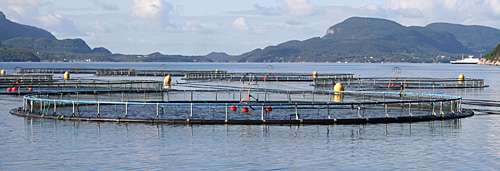Using salmon genome to adapt fish to warmer water

Researchers are studying precociously mature dwarf males for ways to selectively breed farmed salmon that better withstand higher ocean temperatures.
Warmer ocean temperatures resulting from climate change may lead to earlier sexual maturation in salmon – which could spell problems for the aquaculture industry. Now, the Institute of Marine Research is applying knowledge about the salmon genome in experiments to influence the onset of puberty in farmed salmon through selective breeding.
The project, called Salmat, receives funding from the Research Council of Norway as part the research effort targeted towards understanding climate change and the adaptations it requires.
"The project's objective is to identify genes or regions of genetic material that regulate the onset age of sexual maturation in salmon," explains project manager Anna Wargelius, who is a senior scientist at the Institute of Marine Research. "Since puberty is also modulated by environmental factors such as light, temperature and food supply, the project will study whether and how environmental factors affect the genes that control sexual maturation."
Seeking out mutations
In April the project partners held their kick-off meeting in Bergen and Matre. Dr Wargelius already has clear plans for how to achieve the best results from the project. Hers is one of three projects being launched that will utilise knowledge generated from the newly sequenced salmon genome. All three were granted funding under a joint call for proposals by two Research Council of Norway programmes: Aquaculture – An Industry in Growth (HAVBRUK) and Biotechnology for Innovation (BIOTEK2021).
"We will be sequencing and comparing genetic material in salmon from a number of rivers in three geographical regions: Northern Norway, Southern Norway and Russia. The sample specimens will be characterised as either early or late in sexual maturation. By comparing the genomic sequences of fish that spawn early and late in different geographical areas, we hope to find changes in the genome – mutations – that are associated with genes regulating the timing of puberty onset."
Dwarf males are ideal subjects
To find the maximum number of genomic sequences regulating sexual maturation, the researchers will also study dwarf males – salmon that sexually mature early, before even migrating out to sea, and which are far smaller than average.
"Dwarf males are ideal as a model since they sexually mature earlier than normal salmon," says Dr Wargelius.
Another important component of the project involves gathering available knowledge about known factors related to sexual maturation in other types of vertebrates besides salmon, and where their sexual maturation genes are located. Once these locations are identified for the salmon genome, it will be easier to map the genes involved in the timing of puberty onset.
"By combing data from these three methods, we will be able to identify the genetic regions that affect the age at which salmon reach puberty," believes Dr Wargelius.
Experiments with cloned salmon
The second objective of the project is to learn how environmental factors modulate the time of puberty onset in salmon. The researchers will study epigenetic factors that can alter gene expression related to sexual maturation. Some genes are not "hard-coded" but instead can be activated or deactivated by external influences.
"In order to identify possible epigenetic mechanisms related to puberty regulation, we will study various cloned lines of salmon," continues the Salmat project manager. "These genetically identical lines will be exposed to different regimes of temperature and light. Since identical lines will respond identically under the same conditions, differences among the cloned individuals' responses will indicate the epigenetic effects contributed by the environment."
More information: Home page: Aquaculture - An Industry in Growth (HAVBRUK)
Home page: Biotechnology for innovation (BIOTEK2021)
Provided by The Research Council of Norway










.jpg)




